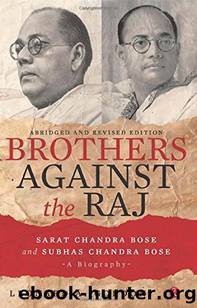Brothers Against the Raj:A Biography of Indian Nationalists Sarat and Subhas Chandra Bose by Leonard a Gordon

Author:Leonard a Gordon [Gordon, Leonard a]
Language: eng
Format: epub
Publisher: Rupa Publications
Published: 2015-09-02T00:00:00+00:00
9
âWe Must Sail in Different Boatsâ1: Gandhi vs. Bose, 1939-41
After all Subhas Babu is not an enemy of his country.
âMahatma Gandhi, 1939 statement2
The love of my conception, if it is as soft as a rose petal, can also be harder than flintâ¦I had the thought I had gained Subhas Babu for all time as a sonâ¦I had the pain of wholly associating myself with the ban pronounced on him.
âMahatma Gandhi, 1940 statement3
I
The victory of Subhas Bose in the Congress presidential race came as a surprise to Mahatma Gandhi and his closest colleagues. The leftists throughout India had backed Boseâattaining the high-watermark of their unity in the 20th century. Thus Bose, the much-better known and more charismatic candidate, won through in this round with his 1,580 votes as against his opponentâs 1,375, and was to be Congress president for 1939.
The victory for a candidate opposing his own choice, however, awakened Gandhi from his somnolence and he issued a hostile and self-accusatory statement two days later. In part, the Mahatma said:
Shri Subhas Bose has achieved a decisive victoryâ¦I must confess that from the very beginning I was decidedly against his re-electionâ¦I do not subscribe to his facts or the arguments in his manifestos. I think that his references to his colleagues were unjustified and unworthy. Nevertheless, I am glad of his victoryâ¦After all Subhas Babu is not an enemy of his country. He has suffered for it. In his opinion his is the most forward and boldest policy and programâ¦The minority may not obstruct on any account. They must abstain when they cannot cooperate.4
Here Gandhi gives hints of what is yet to come. He says the vote was a defeat for his principles and for the rightist team of Gandhians who had long run the Congress organisation. And it was a sign of strength for those Bose called the âleftâ and for a program of resolute opposition to the Raj. But even more than these suggestions in Gandhiâs words, it is a challenge to Bose to direct the Congress executive and run it according to his principles and program.
Immediately after the election and throughout the next few months, Bose was conciliatory towards Gandhi and the Gandhians, responding without bitterness:
I do not know whatâ¦opinion Mahatmaji has of me. But whatever his view may be, it will always be my aim and object to try and win his confidence for the simple reason that it will be a tragic thing for me if I succeed in winning the confidence of other people but fail to win the confidence of Indiaâs greatest man.5
Gandhi and his men, angry with Boseâs description of them in The Indian Struggle as âtired old reactionariesâ who are not prepared for the coming and necessary struggle, were preparing to teach Bose a lesson. On 22 February, 1939, all the Working Committee membersâexcept the Bosesâincluding Jawaharlal Nehru, resigned, leaving the Congress with a president marked for the helm, but without a crew to run the ship.
Bose wanted Gandhiâs approbation. He met with
Download
This site does not store any files on its server. We only index and link to content provided by other sites. Please contact the content providers to delete copyright contents if any and email us, we'll remove relevant links or contents immediately.
| China | India & South Asia |
| Japan |
Fanny Burney by Claire Harman(25795)
Empire of the Sikhs by Patwant Singh(22188)
Out of India by Michael Foss(16317)
Leonardo da Vinci by Walter Isaacson(11927)
Small Great Things by Jodi Picoult(6111)
The Six Wives Of Henry VIII (WOMEN IN HISTORY) by Fraser Antonia(4801)
The Wind in My Hair by Masih Alinejad(4430)
The Lonely City by Olivia Laing(4133)
The Crown by Robert Lacey(4118)
A Higher Loyalty: Truth, Lies, and Leadership by James Comey(4044)
The Iron Duke by The Iron Duke(3655)
Millionaire: The Philanderer, Gambler, and Duelist Who Invented Modern Finance by Janet Gleeson(3577)
Sticky Fingers by Joe Hagan(3459)
Alive: The Story of the Andes Survivors by Piers Paul Read(3324)
Papillon (English) by Henri Charrière(3283)
Joan of Arc by Mary Gordon(3272)
Stalin by Stephen Kotkin(3094)
Aleister Crowley: The Biography by Tobias Churton(3030)
Ants Among Elephants by Sujatha Gidla(2930)
